Question Number 149673 by mnjuly1970 last updated on 06/Aug/21
![solve :: [ 1] 𝛗 := ∫_0 ^( ∞ ) ((ln^( 2) (e x ))/(e^( 4) +x^( 2) )) dx =((π k)/e^( 2) ) k:= ? [ 2 ] Ω := ∫_(0 ) ^( ∞) (( ln^( 3) (x ))/( e^( 2) + x^( 2) )) dx = ?](https://www.tinkutara.com/question/Q149673.png)
$$\:\:\:\mathrm{solve}\::: \\ $$$$\left[\:\mathrm{1}\right]\:\:\:\:\boldsymbol{\phi}\::=\:\int_{\mathrm{0}} ^{\:\:\infty\:} \frac{{ln}^{\:\mathrm{2}} \:\left({e}\:{x}\:\right)}{{e}^{\:\mathrm{4}} \:+{x}^{\:\mathrm{2}} }\:{dx}\:=\frac{\pi\:{k}}{{e}^{\:\mathrm{2}} } \\ $$$$\:\:\:\:\:\:\:\:\:\:\:\:\:\:\:\:\:\:\:\:\:\:\:\:\:\:\:\:{k}:=\:? \\ $$$$\:\:\:\:\:\:\:\:\:\:\:\: \\ $$$$\:\:\:\:\left[\:\mathrm{2}\:\right]\:\:\:\Omega\::=\:\int_{\mathrm{0}\:} ^{\:\infty} \:\frac{\:{ln}^{\:\mathrm{3}} \:\left({x}\:\right)}{\:{e}^{\:\mathrm{2}} +\:{x}^{\:\mathrm{2}} }\:{dx}\:=\:? \\ $$
Answered by mathmax by abdo last updated on 06/Aug/21
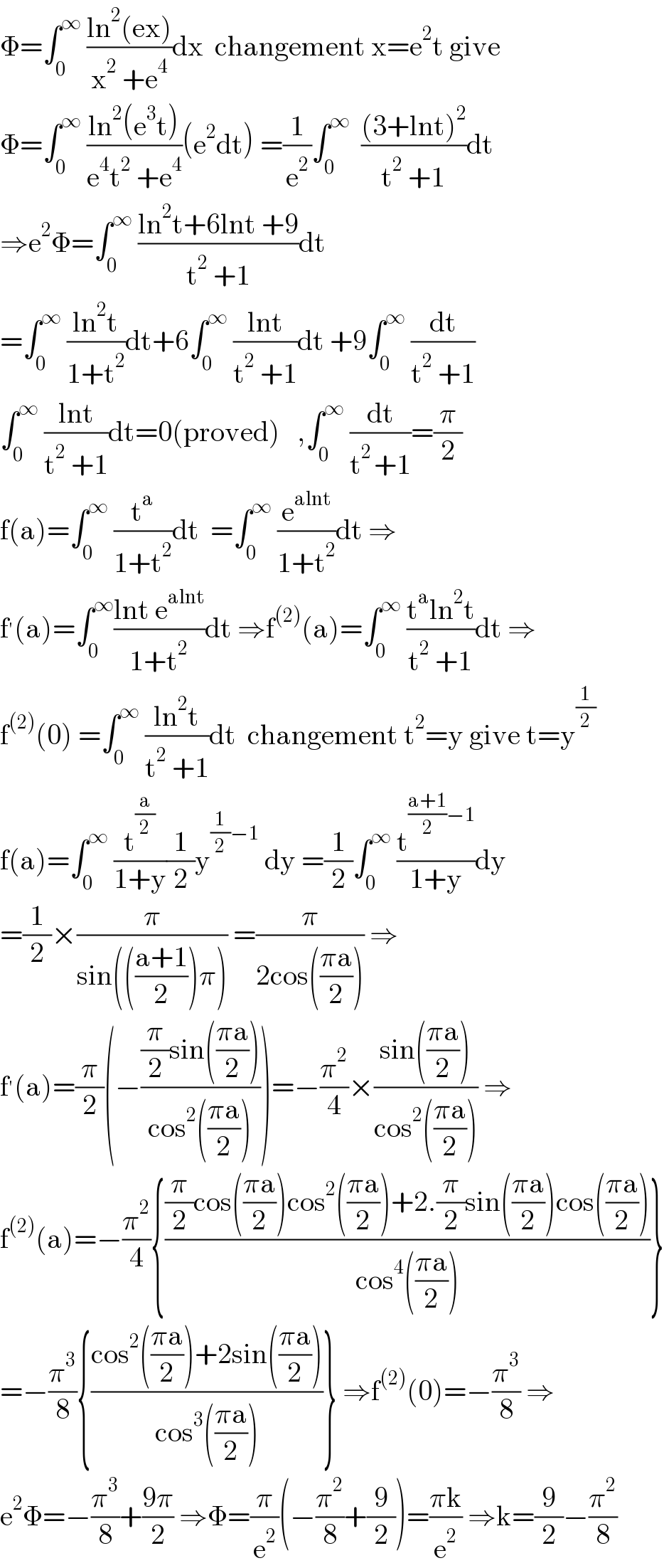
$$\Phi=\int_{\mathrm{0}} ^{\infty} \:\frac{\mathrm{ln}^{\mathrm{2}} \left(\mathrm{ex}\right)}{\mathrm{x}^{\mathrm{2}} \:+\mathrm{e}^{\mathrm{4}} }\mathrm{dx}\:\:\mathrm{changement}\:\mathrm{x}=\mathrm{e}^{\mathrm{2}} \mathrm{t}\:\mathrm{give} \\ $$$$\Phi=\int_{\mathrm{0}} ^{\infty} \:\frac{\mathrm{ln}^{\mathrm{2}} \left(\mathrm{e}^{\mathrm{3}} \mathrm{t}\right)}{\mathrm{e}^{\mathrm{4}} \mathrm{t}^{\mathrm{2}} \:+\mathrm{e}^{\mathrm{4}} }\left(\mathrm{e}^{\mathrm{2}} \mathrm{dt}\right)\:=\frac{\mathrm{1}}{\mathrm{e}^{\mathrm{2}} }\int_{\mathrm{0}} ^{\infty} \:\:\frac{\left(\mathrm{3}+\mathrm{lnt}\right)^{\mathrm{2}} }{\mathrm{t}^{\mathrm{2}} \:+\mathrm{1}}\mathrm{dt} \\ $$$$\Rightarrow\mathrm{e}^{\mathrm{2}} \Phi=\int_{\mathrm{0}} ^{\infty} \:\frac{\mathrm{ln}^{\mathrm{2}} \mathrm{t}+\mathrm{6lnt}\:+\mathrm{9}}{\mathrm{t}^{\mathrm{2}} \:+\mathrm{1}}\mathrm{dt} \\ $$$$=\int_{\mathrm{0}} ^{\infty} \:\frac{\mathrm{ln}^{\mathrm{2}} \mathrm{t}}{\mathrm{1}+\mathrm{t}^{\mathrm{2}} }\mathrm{dt}+\mathrm{6}\int_{\mathrm{0}} ^{\infty} \:\frac{\mathrm{lnt}}{\mathrm{t}^{\mathrm{2}} \:+\mathrm{1}}\mathrm{dt}\:+\mathrm{9}\int_{\mathrm{0}} ^{\infty} \:\frac{\mathrm{dt}}{\mathrm{t}^{\mathrm{2}} \:+\mathrm{1}} \\ $$$$\int_{\mathrm{0}} ^{\infty} \:\frac{\mathrm{lnt}}{\mathrm{t}^{\mathrm{2}} \:+\mathrm{1}}\mathrm{dt}=\mathrm{0}\left(\mathrm{proved}\right)\:\:\:,\int_{\mathrm{0}} ^{\infty} \:\frac{\mathrm{dt}}{\mathrm{t}^{\mathrm{2}\:} +\mathrm{1}}=\frac{\pi}{\mathrm{2}} \\ $$$$\mathrm{f}\left(\mathrm{a}\right)=\int_{\mathrm{0}} ^{\infty} \:\frac{\mathrm{t}^{\mathrm{a}} }{\mathrm{1}+\mathrm{t}^{\mathrm{2}} }\mathrm{dt}\:\:=\int_{\mathrm{0}} ^{\infty} \:\frac{\mathrm{e}^{\mathrm{alnt}} }{\mathrm{1}+\mathrm{t}^{\mathrm{2}} }\mathrm{dt}\:\Rightarrow \\ $$$$\mathrm{f}^{'} \left(\mathrm{a}\right)=\int_{\mathrm{0}} ^{\infty} \frac{\mathrm{lnt}\:\mathrm{e}^{\mathrm{alnt}} }{\mathrm{1}+\mathrm{t}^{\mathrm{2}} }\mathrm{dt}\:\Rightarrow\mathrm{f}^{\left(\mathrm{2}\right)} \left(\mathrm{a}\right)=\int_{\mathrm{0}} ^{\infty} \:\frac{\mathrm{t}^{\mathrm{a}} \mathrm{ln}^{\mathrm{2}} \mathrm{t}}{\mathrm{t}^{\mathrm{2}} \:+\mathrm{1}}\mathrm{dt}\:\Rightarrow \\ $$$$\mathrm{f}^{\left(\mathrm{2}\right)} \left(\mathrm{0}\right)\:=\int_{\mathrm{0}} ^{\infty} \:\frac{\mathrm{ln}^{\mathrm{2}} \mathrm{t}}{\mathrm{t}^{\mathrm{2}} \:+\mathrm{1}}\mathrm{dt}\:\:\mathrm{changement}\:\mathrm{t}^{\mathrm{2}} =\mathrm{y}\:\mathrm{give}\:\mathrm{t}=\mathrm{y}^{\frac{\mathrm{1}}{\mathrm{2}}} \\ $$$$\mathrm{f}\left(\mathrm{a}\right)=\int_{\mathrm{0}} ^{\infty} \:\frac{\mathrm{t}^{\frac{\mathrm{a}}{\mathrm{2}}} }{\mathrm{1}+\mathrm{y}}\frac{\mathrm{1}}{\mathrm{2}}\mathrm{y}^{\frac{\mathrm{1}}{\mathrm{2}}−\mathrm{1}} \:\mathrm{dy}\:=\frac{\mathrm{1}}{\mathrm{2}}\int_{\mathrm{0}} ^{\infty} \:\frac{\mathrm{t}^{\frac{\mathrm{a}+\mathrm{1}}{\mathrm{2}}−\mathrm{1}} }{\mathrm{1}+\mathrm{y}}\mathrm{dy} \\ $$$$=\frac{\mathrm{1}}{\mathrm{2}}×\frac{\pi}{\mathrm{sin}\left(\left(\frac{\mathrm{a}+\mathrm{1}}{\mathrm{2}}\right)\pi\right)}\:=\frac{\pi}{\mathrm{2cos}\left(\frac{\pi\mathrm{a}}{\mathrm{2}}\right)}\:\Rightarrow \\ $$$$\mathrm{f}^{'} \left(\mathrm{a}\right)=\frac{\pi}{\mathrm{2}}\left(−\frac{\frac{\pi}{\mathrm{2}}\mathrm{sin}\left(\frac{\pi\mathrm{a}}{\mathrm{2}}\right)}{\mathrm{cos}^{\mathrm{2}} \left(\frac{\pi\mathrm{a}}{\mathrm{2}}\right)}\right)=−\frac{\pi^{\mathrm{2}} }{\mathrm{4}}×\frac{\mathrm{sin}\left(\frac{\pi\mathrm{a}}{\mathrm{2}}\right)}{\mathrm{cos}^{\mathrm{2}} \left(\frac{\pi\mathrm{a}}{\mathrm{2}}\right)}\:\Rightarrow \\ $$$$\mathrm{f}^{\left(\mathrm{2}\right)} \left(\mathrm{a}\right)=−\frac{\pi^{\mathrm{2}} }{\mathrm{4}}\left\{\frac{\frac{\pi}{\mathrm{2}}\mathrm{cos}\left(\frac{\pi\mathrm{a}}{\mathrm{2}}\right)\mathrm{cos}^{\mathrm{2}} \left(\frac{\pi\mathrm{a}}{\mathrm{2}}\right)+\mathrm{2}.\frac{\pi}{\mathrm{2}}\mathrm{sin}\left(\frac{\pi\mathrm{a}}{\mathrm{2}}\right)\mathrm{cos}\left(\frac{\pi\mathrm{a}}{\mathrm{2}}\right)}{\mathrm{cos}^{\mathrm{4}} \left(\frac{\pi\mathrm{a}}{\mathrm{2}}\right)}\right\} \\ $$$$=−\frac{\pi^{\mathrm{3}} }{\mathrm{8}}\left\{\frac{\mathrm{cos}^{\mathrm{2}} \left(\frac{\pi\mathrm{a}}{\mathrm{2}}\right)+\mathrm{2sin}\left(\frac{\pi\mathrm{a}}{\mathrm{2}}\right)}{\mathrm{cos}^{\mathrm{3}} \left(\frac{\pi\mathrm{a}}{\mathrm{2}}\right)}\right\}\:\Rightarrow\mathrm{f}^{\left(\mathrm{2}\right)} \left(\mathrm{0}\right)=−\frac{\pi^{\mathrm{3}} }{\mathrm{8}}\:\Rightarrow \\ $$$$\mathrm{e}^{\mathrm{2}} \Phi=−\frac{\pi^{\mathrm{3}} }{\mathrm{8}}+\frac{\mathrm{9}\pi}{\mathrm{2}}\:\Rightarrow\Phi=\frac{\pi}{\mathrm{e}^{\mathrm{2}} }\left(−\frac{\pi^{\mathrm{2}} }{\mathrm{8}}+\frac{\mathrm{9}}{\mathrm{2}}\right)=\frac{\pi\mathrm{k}}{\mathrm{e}^{\mathrm{2}} }\:\Rightarrow\mathrm{k}=\frac{\mathrm{9}}{\mathrm{2}}−\frac{\pi^{\mathrm{2}} }{\mathrm{8}} \\ $$
Commented by Ar Brandon last updated on 07/Aug/21
Bravo ��
Commented by Tawa11 last updated on 06/Aug/21

$$\mathrm{great} \\ $$
Commented by Ar Brandon last updated on 06/Aug/21
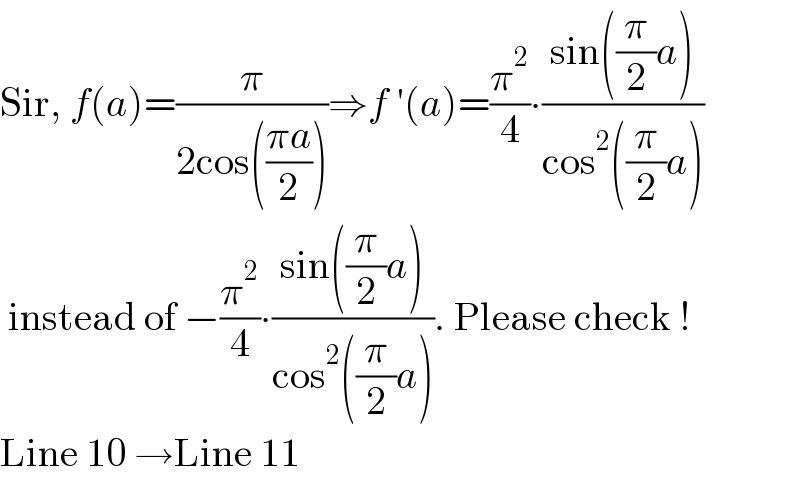
$$\mathrm{Sir},\:{f}\left({a}\right)=\frac{\pi}{\mathrm{2cos}\left(\frac{\pi{a}}{\mathrm{2}}\right)}\Rightarrow{f}\:'\left({a}\right)=\frac{\pi^{\mathrm{2}} }{\mathrm{4}}\centerdot\frac{\mathrm{sin}\left(\frac{\pi}{\mathrm{2}}{a}\right)}{\mathrm{cos}^{\mathrm{2}} \left(\frac{\pi}{\mathrm{2}}{a}\right)} \\ $$$$\:\mathrm{instead}\:\mathrm{of}\:−\frac{\pi^{\mathrm{2}} }{\mathrm{4}}\centerdot\frac{\mathrm{sin}\left(\frac{\pi}{\mathrm{2}}{a}\right)}{\mathrm{cos}^{\mathrm{2}} \left(\frac{\pi}{\mathrm{2}}{a}\right)}.\:\mathrm{Please}\:\mathrm{check}\:! \\ $$$$\mathrm{Line}\:\mathrm{10}\:\rightarrow\mathrm{Line}\:\mathrm{11} \\ $$
Commented by mathmax by abdo last updated on 07/Aug/21
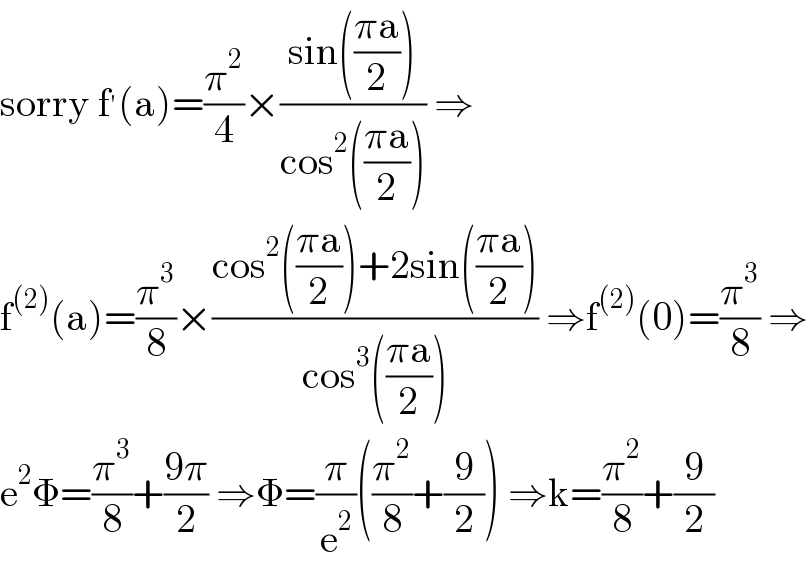
$$\mathrm{sorry}\:\mathrm{f}^{'} \left(\mathrm{a}\right)=\frac{\pi^{\mathrm{2}} }{\mathrm{4}}×\frac{\mathrm{sin}\left(\frac{\pi\mathrm{a}}{\mathrm{2}}\right)}{\mathrm{cos}^{\mathrm{2}} \left(\frac{\pi\mathrm{a}}{\mathrm{2}}\right)}\:\Rightarrow \\ $$$$\mathrm{f}^{\left(\mathrm{2}\right)} \left(\mathrm{a}\right)=\frac{\pi^{\mathrm{3}} }{\mathrm{8}}×\frac{\mathrm{cos}^{\mathrm{2}} \left(\frac{\pi\mathrm{a}}{\mathrm{2}}\right)+\mathrm{2sin}\left(\frac{\pi\mathrm{a}}{\mathrm{2}}\right)}{\mathrm{cos}^{\mathrm{3}} \left(\frac{\pi\mathrm{a}}{\mathrm{2}}\right)}\:\Rightarrow\mathrm{f}^{\left(\mathrm{2}\right)} \left(\mathrm{0}\right)=\frac{\pi^{\mathrm{3}} }{\mathrm{8}}\:\Rightarrow \\ $$$$\mathrm{e}^{\mathrm{2}} \Phi=\frac{\pi^{\mathrm{3}} }{\mathrm{8}}+\frac{\mathrm{9}\pi}{\mathrm{2}}\:\Rightarrow\Phi=\frac{\pi}{\mathrm{e}^{\mathrm{2}} }\left(\frac{\pi^{\mathrm{2}} }{\mathrm{8}}+\frac{\mathrm{9}}{\mathrm{2}}\right)\:\Rightarrow\mathrm{k}=\frac{\pi^{\mathrm{2}} }{\mathrm{8}}+\frac{\mathrm{9}}{\mathrm{2}} \\ $$
Commented by mathmax by abdo last updated on 07/Aug/21

$$\mathrm{yes}\:\mathrm{error}\:\mathrm{of}\:\mathrm{sing}…! \\ $$
Answered by Ar Brandon last updated on 06/Aug/21
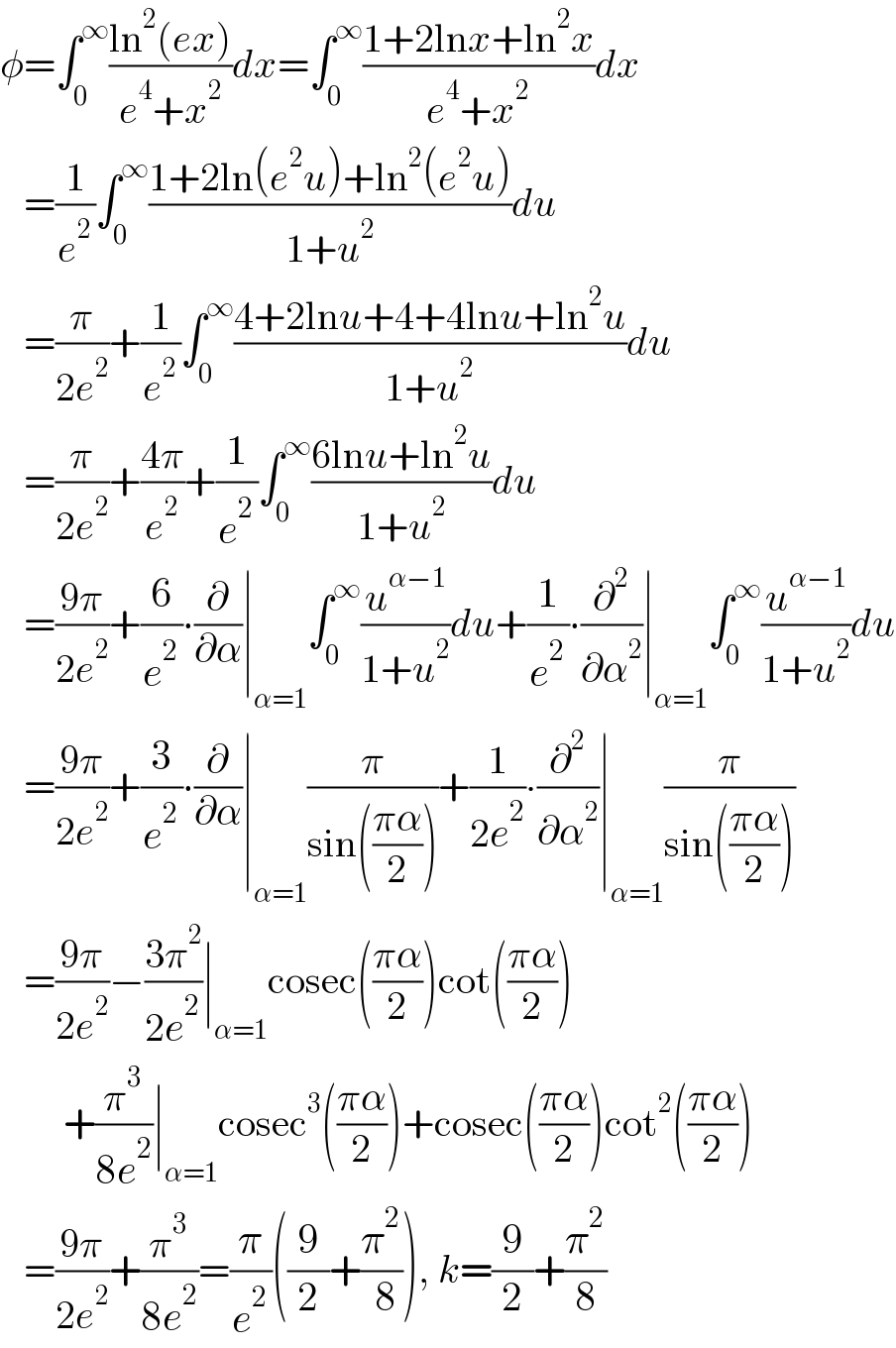
$$\phi=\int_{\mathrm{0}} ^{\infty} \frac{\mathrm{ln}^{\mathrm{2}} \left({ex}\right)}{{e}^{\mathrm{4}} +{x}^{\mathrm{2}} }{dx}=\int_{\mathrm{0}} ^{\infty} \frac{\mathrm{1}+\mathrm{2ln}{x}+\mathrm{ln}^{\mathrm{2}} {x}}{{e}^{\mathrm{4}} +{x}^{\mathrm{2}} }{dx} \\ $$$$\:\:\:=\frac{\mathrm{1}}{{e}^{\mathrm{2}} }\int_{\mathrm{0}} ^{\infty} \frac{\mathrm{1}+\mathrm{2ln}\left({e}^{\mathrm{2}} {u}\right)+\mathrm{ln}^{\mathrm{2}} \left({e}^{\mathrm{2}} {u}\right)}{\mathrm{1}+{u}^{\mathrm{2}} }{du} \\ $$$$\:\:\:=\frac{\pi}{\mathrm{2}{e}^{\mathrm{2}} }+\frac{\mathrm{1}}{{e}^{\mathrm{2}} }\int_{\mathrm{0}} ^{\infty} \frac{\mathrm{4}+\mathrm{2ln}{u}+\mathrm{4}+\mathrm{4ln}{u}+\mathrm{ln}^{\mathrm{2}} {u}}{\mathrm{1}+{u}^{\mathrm{2}} }{du} \\ $$$$\:\:\:=\frac{\pi}{\mathrm{2}{e}^{\mathrm{2}} }+\frac{\mathrm{4}\pi}{{e}^{\mathrm{2}} }+\frac{\mathrm{1}}{{e}^{\mathrm{2}} }\int_{\mathrm{0}} ^{\infty} \frac{\mathrm{6ln}{u}+\mathrm{ln}^{\mathrm{2}} {u}}{\mathrm{1}+{u}^{\mathrm{2}} }{du} \\ $$$$\:\:\:=\frac{\mathrm{9}\pi}{\mathrm{2}{e}^{\mathrm{2}} }+\frac{\mathrm{6}}{{e}^{\mathrm{2}} }\centerdot\frac{\partial}{\partial\alpha}\mid_{\alpha=\mathrm{1}} \int_{\mathrm{0}} ^{\infty} \frac{{u}^{\alpha−\mathrm{1}} }{\mathrm{1}+{u}^{\mathrm{2}} }{du}+\frac{\mathrm{1}}{{e}^{\mathrm{2}} }\centerdot\frac{\partial^{\mathrm{2}} }{\partial\alpha^{\mathrm{2}} }\mid_{\alpha=\mathrm{1}} \int_{\mathrm{0}} ^{\infty} \frac{{u}^{\alpha−\mathrm{1}} }{\mathrm{1}+{u}^{\mathrm{2}} }{du} \\ $$$$\:\:\:=\frac{\mathrm{9}\pi}{\mathrm{2}{e}^{\mathrm{2}} }+\frac{\mathrm{3}}{{e}^{\mathrm{2}} }\centerdot\frac{\partial}{\partial\alpha}\mid_{\alpha=\mathrm{1}} \frac{\pi}{\mathrm{sin}\left(\frac{\pi\alpha}{\mathrm{2}}\right)}+\frac{\mathrm{1}}{\mathrm{2}{e}^{\mathrm{2}} }\centerdot\frac{\partial^{\mathrm{2}} }{\partial\alpha^{\mathrm{2}} }\mid_{\alpha=\mathrm{1}} \frac{\pi}{\mathrm{sin}\left(\frac{\pi\alpha}{\mathrm{2}}\right)} \\ $$$$\:\:\:=\frac{\mathrm{9}\pi}{\mathrm{2}{e}^{\mathrm{2}} }−\frac{\mathrm{3}\pi^{\mathrm{2}} }{\mathrm{2}{e}^{\mathrm{2}} }\mid_{\alpha=\mathrm{1}} \mathrm{cosec}\left(\frac{\pi\alpha}{\mathrm{2}}\right)\mathrm{cot}\left(\frac{\pi\alpha}{\mathrm{2}}\right) \\ $$$$\:\:\:\:\:\:\:\:+\frac{\pi^{\mathrm{3}} }{\mathrm{8}{e}^{\mathrm{2}} }\mid_{\alpha=\mathrm{1}} \mathrm{cosec}^{\mathrm{3}} \left(\frac{\pi\alpha}{\mathrm{2}}\right)+\mathrm{cosec}\left(\frac{\pi\alpha}{\mathrm{2}}\right)\mathrm{cot}^{\mathrm{2}} \left(\frac{\pi\alpha}{\mathrm{2}}\right) \\ $$$$\:\:\:=\frac{\mathrm{9}\pi}{\mathrm{2}{e}^{\mathrm{2}} }+\frac{\pi^{\mathrm{3}} }{\mathrm{8}{e}^{\mathrm{2}} }=\frac{\pi}{{e}^{\mathrm{2}} }\left(\frac{\mathrm{9}}{\mathrm{2}}+\frac{\pi^{\mathrm{2}} }{\:\mathrm{8}}\right),\:{k}=\frac{\mathrm{9}}{\mathrm{2}}+\frac{\pi^{\mathrm{2}} }{\mathrm{8}} \\ $$
Commented by Ar Brandon last updated on 06/Aug/21
It was a pleasure, Sir ��
Commented by mnjuly1970 last updated on 06/Aug/21

$${very}\:{nice}\:{mr}\:{brandon}.. \\ $$
Answered by Ar Brandon last updated on 06/Aug/21
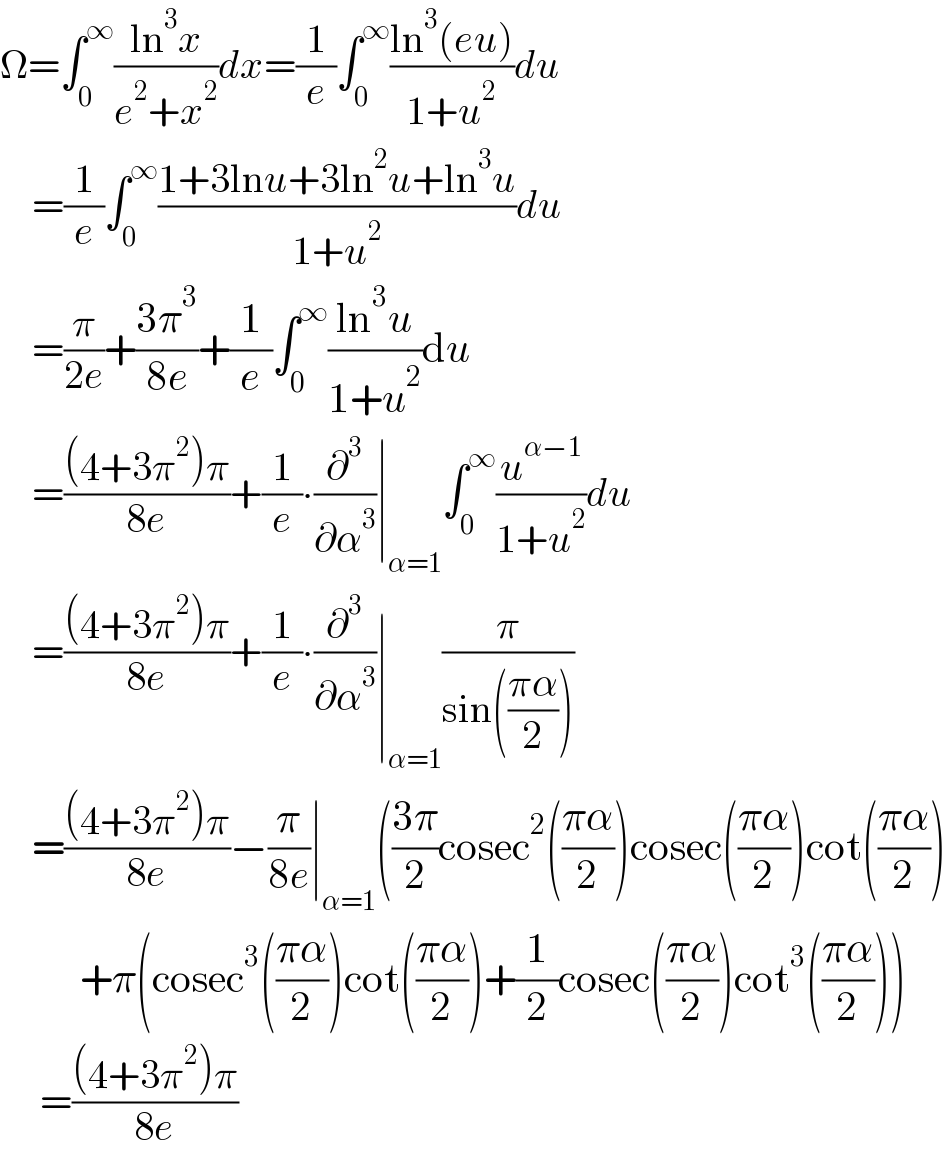
$$\Omega=\int_{\mathrm{0}} ^{\infty} \frac{\mathrm{ln}^{\mathrm{3}} {x}}{{e}^{\mathrm{2}} +{x}^{\mathrm{2}} }{dx}=\frac{\mathrm{1}}{{e}}\int_{\mathrm{0}} ^{\infty} \frac{\mathrm{ln}^{\mathrm{3}} \left({eu}\right)}{\mathrm{1}+{u}^{\mathrm{2}} }{du} \\ $$$$\:\:\:\:=\frac{\mathrm{1}}{{e}}\int_{\mathrm{0}} ^{\infty} \frac{\mathrm{1}+\mathrm{3ln}{u}+\mathrm{3ln}^{\mathrm{2}} {u}+\mathrm{ln}^{\mathrm{3}} {u}}{\mathrm{1}+{u}^{\mathrm{2}} }{du} \\ $$$$\:\:\:\:=\frac{\pi}{\mathrm{2}{e}}+\frac{\mathrm{3}\pi^{\mathrm{3}} }{\mathrm{8}{e}}+\frac{\mathrm{1}}{{e}}\int_{\mathrm{0}} ^{\infty} \frac{\mathrm{ln}^{\mathrm{3}} {u}}{\mathrm{1}+{u}^{\mathrm{2}} }\mathrm{d}{u} \\ $$$$\:\:\:\:=\frac{\left(\mathrm{4}+\mathrm{3}\pi^{\mathrm{2}} \right)\pi}{\mathrm{8}{e}}+\frac{\mathrm{1}}{{e}}\centerdot\frac{\partial^{\mathrm{3}} }{\partial\alpha^{\mathrm{3}} }\mid_{\alpha=\mathrm{1}} \int_{\mathrm{0}} ^{\infty} \frac{{u}^{\alpha−\mathrm{1}} }{\mathrm{1}+{u}^{\mathrm{2}} }{du} \\ $$$$\:\:\:\:=\frac{\left(\mathrm{4}+\mathrm{3}\pi^{\mathrm{2}} \right)\pi}{\mathrm{8}{e}}+\frac{\mathrm{1}}{{e}}\centerdot\frac{\partial^{\mathrm{3}} }{\partial\alpha^{\mathrm{3}} }\mid_{\alpha=\mathrm{1}} \frac{\pi}{\mathrm{sin}\left(\frac{\pi\alpha}{\mathrm{2}}\right)} \\ $$$$\:\:\:\:=\frac{\left(\mathrm{4}+\mathrm{3}\pi^{\mathrm{2}} \right)\pi}{\mathrm{8}{e}}−\frac{\pi}{\mathrm{8}{e}}\mid_{\alpha=\mathrm{1}} \left(\frac{\mathrm{3}\pi}{\mathrm{2}}\mathrm{cosec}^{\mathrm{2}} \left(\frac{\pi\alpha}{\mathrm{2}}\right)\mathrm{cosec}\left(\frac{\pi\alpha}{\mathrm{2}}\right)\mathrm{cot}\left(\frac{\pi\alpha}{\mathrm{2}}\right)\right. \\ $$$$\:\:\:\:\:\:\:\:\:\:+\pi\left(\mathrm{cosec}^{\mathrm{3}} \left(\frac{\pi\alpha}{\mathrm{2}}\right)\mathrm{cot}\left(\frac{\pi\alpha}{\mathrm{2}}\right)+\frac{\mathrm{1}}{\mathrm{2}}\mathrm{cosec}\left(\frac{\pi\alpha}{\mathrm{2}}\right)\mathrm{cot}^{\mathrm{3}} \left(\frac{\pi\alpha}{\mathrm{2}}\right)\right) \\ $$$$\:\:\:\:\:=\frac{\left(\mathrm{4}+\mathrm{3}\pi^{\mathrm{2}} \right)\pi}{\mathrm{8}{e}} \\ $$
Commented by mnjuly1970 last updated on 06/Aug/21

$${bravo}\:{mr}\:{brandon}… \\ $$
